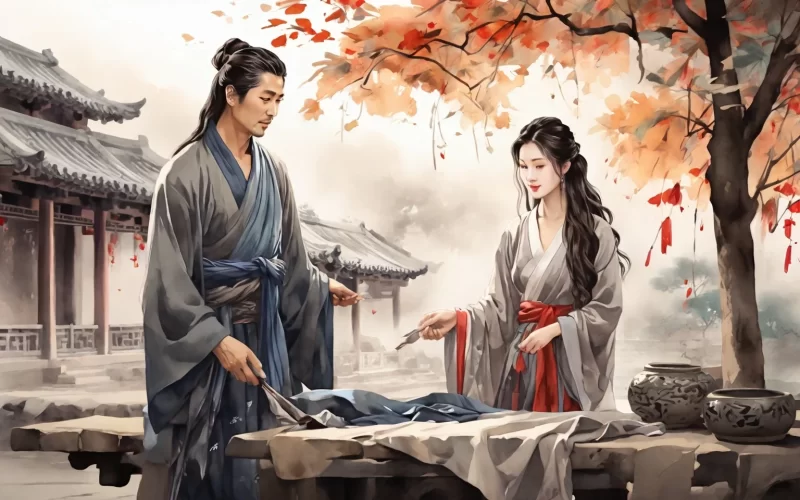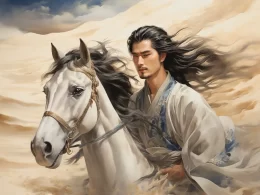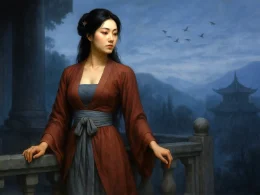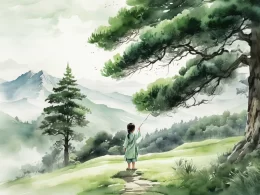Recalled together after an exile of ten years,
Again we're banished for long miles and say adieu.
We reappear but unlike our noble compeers;
Thrice in exile I feel I'm unworthy of you.
We watch returning wild geese till they're out of sight;
We're sad to hear the monkey wail with broken heart.
The Western River flows far from the Southern height.
Longing for each other, can we be kept apart?
Original Poem
「再授连州至衡阳酬柳柳州赠别」
刘禹锡
去国十年同赴召,渡湘千里又分歧。
重临事异黄丞相,三黜名惭柳士师。
归目并随回雁尽,愁肠正遇断猿时。
桂江东过连山下,相望长吟有所思。
Interpretation
This poem was composed in the tenth year of the Yuanhe era (815 AD), when Liu Yuxi was forty-four years old. In the spring of that year, he and Liu Zongyuan had just been recalled to Chang'an. Before they could even regain their footing, Liu Yuxi was exiled once more because of his poem that declared, "The peach trees in the Temple of Mystic Metropolis… / Were all planted after I, young Liu, left the room." Liu Yuxi was appointed Prefect of Lianzhou, and Liu Zongyuan Prefect of Liuzhou. Traveling south together, they reached Hengyang, where their paths inevitably diverged. Fourteen years earlier, following the failure of the Yongzhen Reform, they had been exiled simultaneously—Liu Yuxi to Langzhou, and Liu Zongyuan to Yongzhou. A decade later, they were recalled together, only to be exiled together once more. Fate bound them tightly together, yet at every turn pushed them in different directions.
Hengyang, where the Xiang River meets the Zheng River, was the fork in the road leading to Lingnan and Guangxi. By the ferry crossing, Liu Zongyuan wrote "Parting with Mengde at Hengyang as Our Paths Divide." Liu Yuxi composed this poem in response. This was the last time they would see each other. Four years later, Liu Zongyuan died of illness in Liuzhou at the age of forty-seven. Liu Yuxi supported his friend's orphaned children, compiled his literary works, and spent the rest of his life fulfilling the promise made at that ferry crossing.
First Couplet: "去国十年同赴召,渡湘千里又分歧。"
Qù guó shí nián tóng fù zhào, dù Xiāng qiānlǐ yòu fēnqí.
Ten years away from the capital, we answered the summons together;
*Now, after crossing the Xiang River for a thousand *li, our paths must part again here.
The opening is a somber summation. "Ten years away from the capital"—a decade of exile is long enough to age a man, and long enough to forge a life-and-death bond between two. "We answered the summons together" held a brief, three-word glimmer of hope; they thought their ordeal was finally over. But immediately following is "our paths must part again"; the word "again" lays bare the heartlessness of fate. "After crossing the Xiang River for a thousand li" literally describes the distance of their journey, but more metaphorically, it represents the length of the life they have shared. They have come so far together, yet still must part.
Second Couplet: "重临事异黄丞相,三黜名惭柳士师。"
Chóng lín shì yì Huáng chéngxiàng, sān chù míng cán Liǔ shìshī.
My return to this place differs from the circumstances of the worthy Minister Huang;
Thrice dismissed, in reputation I am ashamed before a man like Master Liu, the straight and just.
This couplet employs two allusions for self-comparison. "Minister Huang" refers to Huang Ba of the Han Emperor Xuan's time, who served two terms as the Grand Administrator of Yingchuan with outstanding administrative achievements, and was welcomed by throngs of common people upon his second appointment. Liu Yuxi says that he, too, is "returning" (he had previously been appointed Prefect of Lianzhou, though he never actually assumed the post), but his circumstances are completely different—he is not returning in glory, but in renewed exile. This is self-mockery, and even more, a pointed satire of the current political situation.
"Master Liu" refers to Liuxia Hui of the Spring and Autumn period, who was dismissed from office three times yet never left the state of his parents. Confucius praised him for "serving men with the upright Way." By comparing Liu Zongyuan to Liuxia Hui and saying "in reputation I am ashamed before" him, Liu Yuxi pays tribute to his friend's integrity and perseverance, while also expressing his own modesty. Both men suffered triple dismissal, but Liu Yuxi grants the higher evaluation to Liu Zongyuan.
Third Couplet: "归目并随回雁尽,愁肠正遇断猿时。"
Guī mù bìng suí huí yàn jìn, chóu cháng zhèng yù duàn yuán shí.
Our homeward gazes, together, follow the returning geese until they vanish;
Our hearts, filled with sorrow, now meet the moment of the severed ape's cry.
This couplet contains the poem's most concentrated emotion. The four words "our homeward gazes, together" depict the two men standing at the ferry, looking north simultaneously—toward Chang'an, the direction of home, the place they can no longer return. The wild geese can fly back north; they can only travel further south. "Until they vanish"—their line of sight is cut by the horizon, and with it, hope. "The moment of the severed ape's cry": in classical poetry, the cry of an ape signifies sorrow. Here, an added layer is that "severed ape" refers to an ape separated from its troop, whose cry is the most mournful. The poet, at the moment he is about to be severed from his friend, finds the ape's cry perfectly mirroring the lament within their hearts. Scene and state of mind merge flawlessly.
Fourth Couplet: "桂江东过连山下,相望长吟有所思。"
Guìjiāng dōng guò Liánshān xià, xiāng wàng cháng yín yǒu suǒ sī.
The Eastern River flows east, passing by the foot of the Lian Mountains;
Gazing toward each other from afar, chanting long, our thoughts are with one another.
The conclusion employs imaginative imagery. "The Eastern River" is the Liu River, which flows past Liuzhou; "the Lian Mountains" are in Lianzhou. These two rivers do not actually connect, yet the poet has one "pass by" the other—this is a geographical imagination, and even more, a connection of the heart and mind. They can no longer travel together, but the rivers can symbolize the flow of longing. "Gazing toward each other from afar, chanting long" is the promise they leave for each other. Four years later, after Liu Zongyuan's death, Liu Yuxi still "chanted long" unceasingly, editing his friend's posthumous manuscripts, caring for his orphaned children, spending a lifetime fulfilling these five words.
Holistic Appreciation
This poem is Liu Yuxi's response to Liu Zongyuan's parting gift, and it stands as one of the most moving testaments to friendship in the history of Chinese literature. The poem's four couplets present a clear structure: the first narrates, outlining their shared experience and the immediate separation; the second uses allusions, reflecting their own fates through historical figures, blending self-mockery with respect for his friend; the third depicts scenery, using the returning geese and the severed ape's cry to amplify the sorrow of parting, perfectly fusing emotion with scene; the fourth concludes with imaginative imagery, using the rivers to symbolize the enduring nature of their friendship, ending in profound longing.
The most moving aspect of the poem is that profound sense of synchrony—they "answered the summons together," and now "must part again"; their "homeward gazes" are "together"; their "hearts, filled with sorrow" meet the same moment; even their being "thrice dismissed" happened simultaneously. Liu Yuxi uses numerous words implying unity to tightly bind the fates of the two men together, only to write of their parting at the moment of greatest intimacy. This technique elevates their friendship beyond time and space, making it eternal.
Artistic Merits
- Precise Use of Allusion with Profound Meaning: The allusions to Huang Ba and Liuxia Hui not only fit the identities of the two men but also implicitly contain an evaluation of their own plight. The two words "am ashamed" are especially clever; superficially expressing modesty, they in fact convey the highest affirmation of his friend's character.
- Narrative Technique Interweaving Time and Space: The first couplet moves from a span of ten years to a journey of a thousand li, then from the immediate divergence looks back upon the road traveled. Time and space leap constantly, yet always revolve around the core theme of "parting."
- Personification of Natural Imagery: The "returning geese" and the "severed ape" are both actual scenes before the eyes and projections of inner emotion. The geese can return north while the men cannot; the ape is severed from its troop as the men are about to be severed from each other—the natural imagery becomes the embodiment of their feelings.
- Concluding Method that Blends the Real and the Imagined: The final couplet's act of having the unconnected Eastern River and Lian Mountains "pass by" each other is a classic use of imagined imagery. This defiance of geographical truth most truthfully expresses the depth of their longing.
- Well-balanced Parallelism without Losing Fluidity: All four couplets of the poem employ parallelism, yet show no trace of forced artifice. "Ten years away" parallels "crossing the Xiang River for a thousand li"; "Our homeward gazes, together" parallels "Our hearts, filled with sorrow." The precision appears natural, exemplifying Liu Yuxi's mature style in regulated verse.
Insights
This poem is about parting, but what is remembered is the "gazing toward each other from afar" that comes after. Liu Yuxi and Liu Zongyuan spent little of their lives together, moved about like chess pieces by power. They had no ability to resist fate, but at the Hengyang ferry they left a pact: from then on, even if separated by a thousand mountains and rivers, they would still "gaze toward each other from afar, chanting long." This pact supported Liu Yuxi through the latter half of his life. Four years later, after Liu Zongyuan's death, he wrote "Returning to Hengyang, Mourning for Liu Yizhou," and in the prefaces to his friend's posthumous works repeatedly mentioned the affection of those years. He said that every time he read Liu Zongyuan's poems, he "could not help but close the scroll in sorrow."
What moves us in reading this poem is not the lament of two politically frustrated men, but their choice, in their moment of greatest powerlessness, to use "gazing toward each other from afar" to resist separation, and to use "chanting long" to resist oblivion. Fate could strip them of their official posts, their hometowns, their stable lives, but it could not strip them of this mutually affirmed relationship. In an age like today, where people meet easily and forget just as easily, this kind of friendship of "gazing toward each other from afar, chanting long" seems especially precious. It reminds us: true friendship is not about seeing each other every day, nor is it about being in constant contact. It is, rather, that after a long separation, one can still "gaze toward each other from afar," and is still willing to "chant long."
Poem translator
Xu Yuanchong (许渊冲)
About the poet
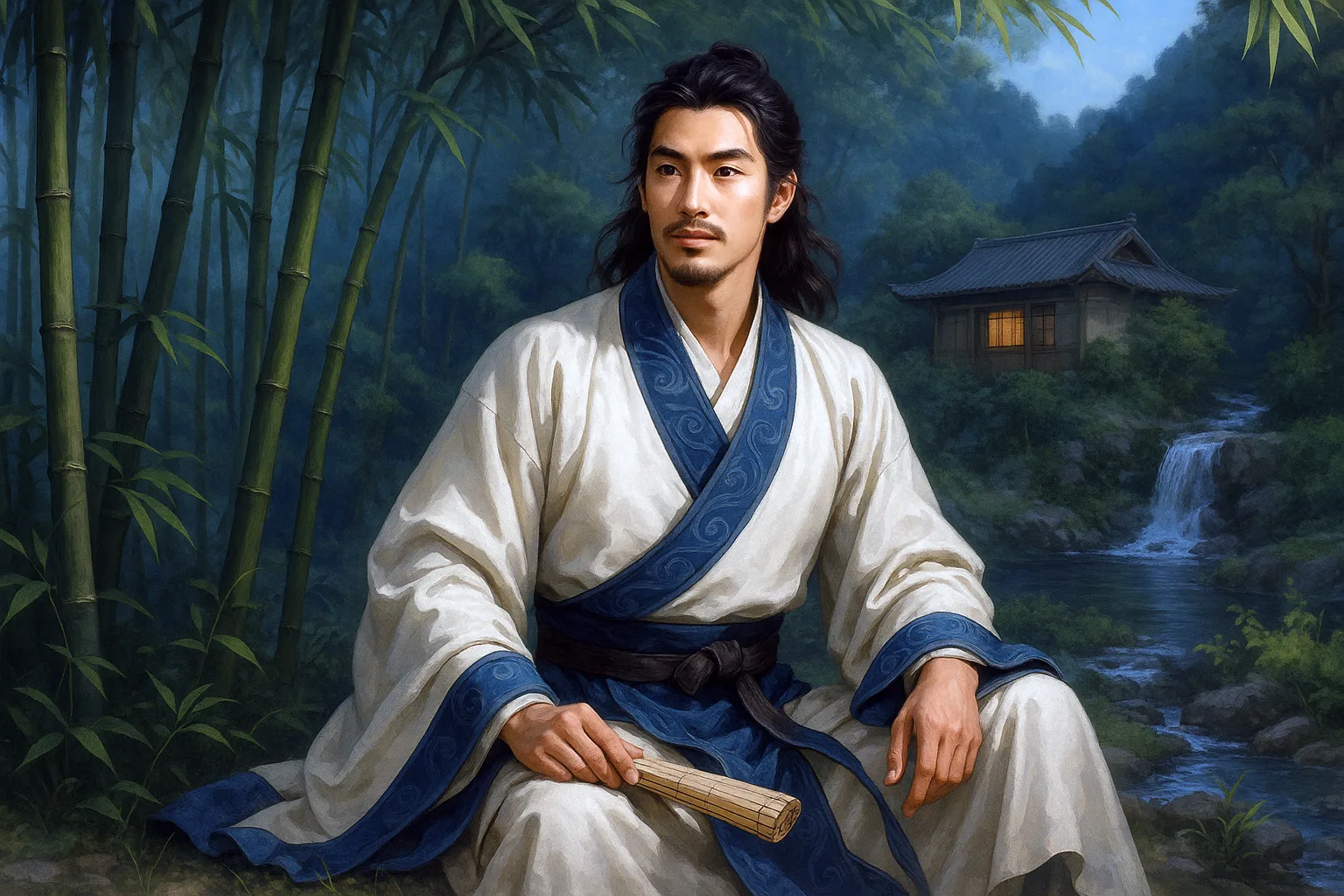
Liu Yuxi(刘禹锡), 772 - 842 AD, was a native of Hebei. He was a progressive statesman and thinker in the middle of the Tang Dynasty, and a poet with unique achievements in this period. In his compositions, there is no lack of poems reflecting current affairs and the plight of the people.







